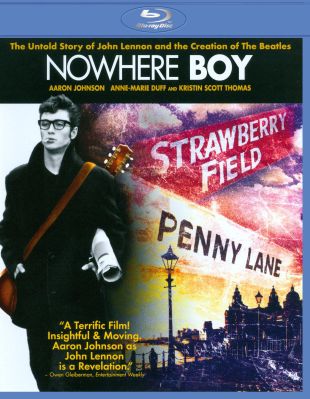
Though handsomely mounted, Sam Taylor-Wood's biopic of John Lennon's teenage years turns a blind eye to the consequences of its main conflict, and because of that the film doesn't come anywhere close to achieving the often brutal honesty that made John a hero to millions.
John Lennon's adolescence certainly wasn't without drama. The movie's John (Aaron Johnson), who lives with his stern but loving aunt Mimi (Kristin Scott Thomas), discovers that his mother, Julia (Anne-Marie Duff), who left him to Mimi's care years before, actually lives just a few streets away from them. John plays hooky to spend the day with Julia, leading to further visits, and soon she's giving her once-estranged son banjo lessons. All the while, John is haunted by memories of his parents fighting when he was a young boy, and soon the rebellious teen starts to question his mom about where his dad is. When Mimi learns that the emotionally unstable Julia has gotten back into John's life, the guardian wants to stop her -- a fight that leads to John discovering painful family secrets.
There are some interesting ideas at play here. Namely, John's reactions to his flirty, bipolar mother are profoundly ambivalent -- he's alternately possessive and dismissive of Julia, as well as overwhelmed by his feelings. The film is at its most fascinating when it touches on John's jealousy of his new musical partner Paul McCartney's easy friendship with Julia. In addition, Scott Thomas and Duff are both so good that the story about their damaged sisterly bond becomes the most emotionally affecting aspect of the film.
Sadly, while the film is well-made, the solid acting, music cues, editing, and set design can't make up for a script that's flawed in its conception. Specifically, if this story weren't happening to John Lennon, we wouldn't care very much about it. If this were a period piece about some generic Liverpool teen it would never hook an audience. The family secrets aren't terribly shocking -- in fact they are widely known by Beatles fans, the group of people most likely to be interested in this film. Secondarily, the characters engaged in the main conflict are Mimi and Julia, not John -- the movie makes the mistake of turning what is essentially a secondary character into the story's center.
If the film had played up how Julia's seemingly manic-depressive condition was passed down to John, the film would have stood on its own without the necessity of exploiting the Beatles and Lennon legacy for dramatic effect. Unfortunately, the screenplay overlooks the real ramifications of this part of John's life. While the filmmakers go to great lengths to make parallels between John's unconventional home life and his transcendent songwriting, the movie downplays how his complicated relationships with these two women may have scarred him for life. The movie concludes with text informing us that John called Mimi once a week for the rest of his life, giving the film a seemingly happy ending (contradicted slightly as those words appear onscreen accompanied by John's song "Mother"). A more honest piece of information to share might have been that never in his life did John establish and maintain a healthy, monogamous, drama-free sexual relationship with a woman. By cherry-picking the events it chooses to cover so assiduously, Nowhere Boy ends up falling short as both a portrait of John Lennon and as an engaging drama.
